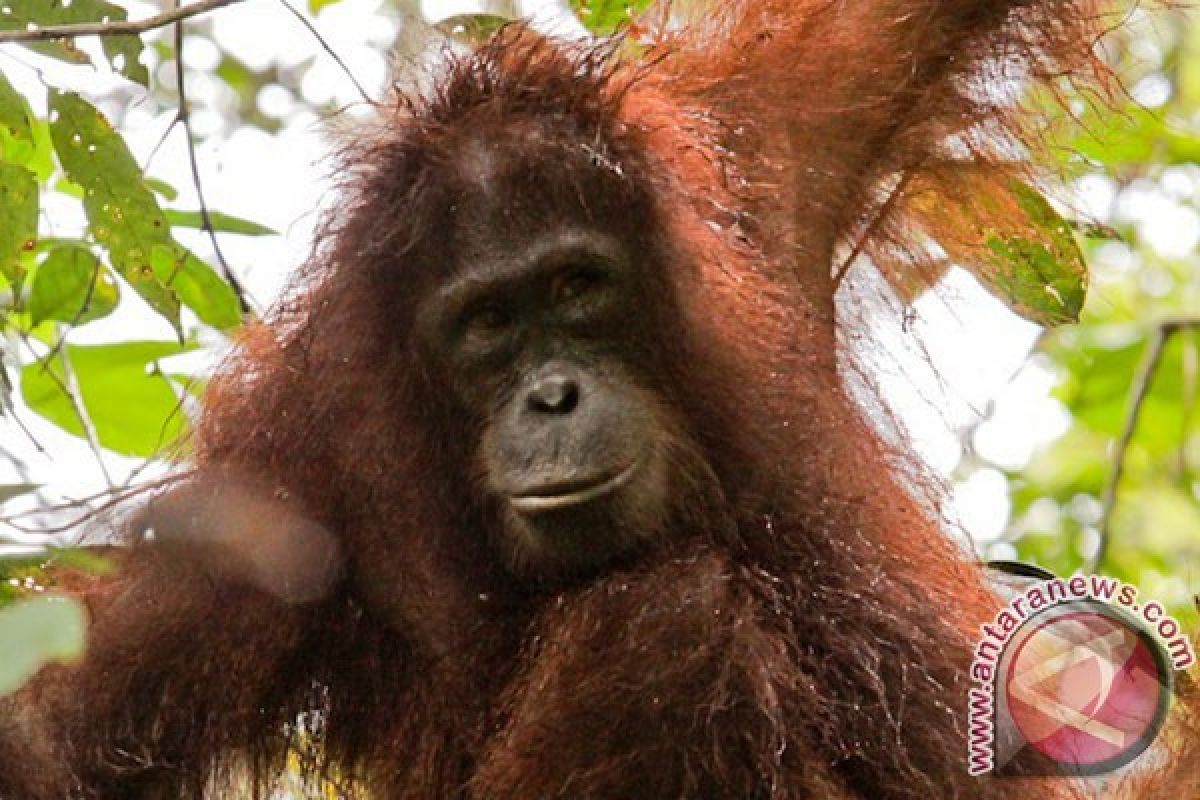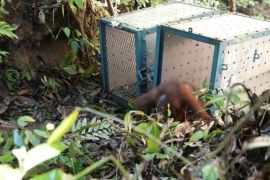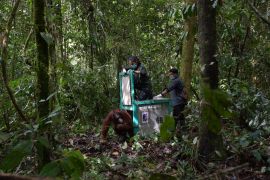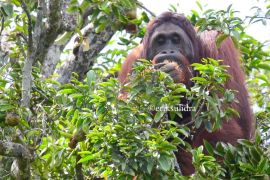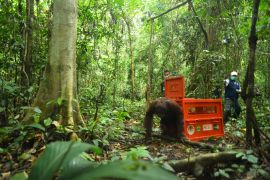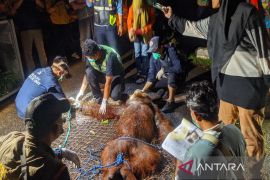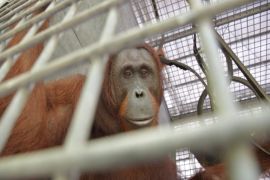And this was manifested recently when a 16 or 17-year-old male orangutan weighing around 70 kilograms strayed into a plantation area, while presumably searching for food.
However, after the great ape wandered into a nearby human settlement by mistake, its residents instead of feeding him tried to use different tactics to drive him out of the area, and eventually ended up injuring the orangutan fatally.
The Kalimantan or Bornean orangutan, which hails from the `Pongo pygmaeus pygmaeus` sub-species, was exposed to fire by the local villagers in a bid to scare him off the land in the Parit Wadongkak area of the Wajok Hilir village of Pontianak in West Kalimantan on Sunday.
Officials at the local Natural Resources Conservation Agency (BKSDA) and NGO activists were also called for help and they tried anesthetizing the animal for evacuation but failed.
After three days of unsuccessful attempts at driving away the orangutan, a few local residents tried lighting a fire to produce smoke, which they thought will scare off the ape who was hanging on to a coconut tree at the time, but the fire soon leapt out of control and scorched the coconut tree as well as the orangutan.
A local nature conservation officer was reportedly moved to tears after seeing the old orangutan being singed. The coconut tree was eventually felled and the orangutan was rushed to the fire brigade station of Manggala Agni of Rasau Jaya in the Kubu Raya district, where he was treated for two days.
But the dehydrated orangutan, who had sustained severe burn injuries, was reportedly under a lot of stress because of the incident.
The condition of the orangutan improved marginally on August 29, after he was transferred to the International Animal Rescue Rehabilitation and Conservation Center in the Ketapang district.
However, he succumbed to his injuries the same day at around 10:30 p.m. local time, with dehydration and distress being attributed as the reasons for his death.
"The orangutan died at around 10:30 p.m. local time. The joint team has decided to take his body to Pontianak for an autopsy," WWF-Indonesia`s Conservation Coordinator Chaerul Saleh told the press in Jakarta on Thursday.
The Indonesian chapter of the World Wildlife Federation (WWF) has also expressed its concern for the circumstances which led to the death of the orangutan.
"WWF is very concerned and regrets the incident. It should have not happened," Saleh stated.
The WWF plans to conduct an investigation into the circumstances that forced the orangutan to desert his natural habitat.
WWF West Kalimantan coordinator Hermayani Putra also expressed sadness over the demise of the orangutan, in spite of the serious rescue efforts made to save him.
The Orangutan is the only great ape that exists outside of Africa and has been listed as an endangered species. The three other species of apes, namely the Gorilla or `Gorilla gorilla`, the Chimpanzee or `Pan Troglodytes` and the Bonobo or `Pan panicus` are all found only in Africa.
Two types of orangutans can be currently found living in Indonesia. These have been identified as the Bornean orangutan or the `Pongo pygmaeus` and the Sumatran orangutan or the `Pongo Abelii`. According to the IUCN red list, the latter species has been classified as critically endangered.
Orangutan populations are continuing to dwindle due to the damage wreaked on their natural habitats. The forests of Kalimantan currently house around 57,000 orangutans, while those found in Sumatra have been pegged at around 7,500.
WWF`s Saleh explained that the destruction of the orangutan`s natural habitat occurs due to the conversion of natural forests for non-forest use like a plantation or logging, which can be carried out both legally and illegally, and because of forest fires and poaching.
Poachers normally try to catch orangutan babies for sale in the market, and when they try to trap the babies, they must kill the mother first.
The orangutan baby is normally placed in a canopy and it's the only place where it can be reached. So for trapping every baby, the poachers first have to kill at least one adult female ape.
"But what are the long-term effects of poaching? The killing of every orangutan results in the destruction of something bigger; i.e. trees. Orangutans operate as the chief distributor of seeds throughout the forest, which plays a vital function in maintaining the balance and sustainability of the ecosystem", Saleh pointed out.
"Their existence is very important for the maintenance of their habitat. If the orangutan is gone from the forest, then someday the forest will also be gone. So you have to save the orangutan in order to save the forest and yourself," he added.
In 1990, the Indonesian government established Law No. 5 of 1990 titled `Natural Resource Biodiversity and Ecosystem Conservation`. This law protects endangered species including the orangutan from poachers and others by imposing a maximum sentence of imprisonment of up to five years and a Rp100,000,000 fine.
But in spite of existing laws and regulations, the orangutans` plight continues to worsen.
Many orangutans, often considered as pests by oil palm plantation companies, have been reportedly killed between 2009 and 2010 at the Puan Cepak village in the Muara Kaman sub district of the Kutai Kartanegara district in the East Kalimantan province.
The police have questioned scores of witnesses and have also sought evidence through the publication of photos. However, collecting evidence is not an easy task. As per latest reports, the police have named at least four suspects and arrested two of them following the discovery of new evidence.
According to a recent study, around 70 percent of orangutan habitats are in an extremely vulnerable state, because they are located outside conservation areas, a fact that can threaten the primate`s preservation.
Only 30 percent of the total orangutan habitats are currently protected because they are inside conservation areas, Director of The Nature Conservancy (TNC) Niel Makinuddin said recently, while launching an executive summary of the Kalimantan Orangutan Portrait.
Linda Sukandar, WWF-Indonesia Fund Raising Manager wrote on WWF-Indonesia` website on May 9 that at on an average, two orangutans are killed every day for the consumption of their meat or because they are considered as pests by local farmers and plantation companies.
Orangutans share up to 97 percent of the human DNA, and are therefore are hardly aggressive and can easily coexist with human beings, Sukandar added.
"The preservation of the orangutan has become an urgent need and one of biggest priorities of the WWF is to save the primate, which is being done under the aegis of a programme titled, `Best Friends of Orangutans`," she noted.
Saleh also pointed out that in addition to the similarity with the human DNA, orangutans` relationship human beings is also evident in their name, as "orang" means person and "hutan" means forest, which can be loosely translated to "man of the forest".
In some ways, the extinction of these primates is tantamount to human genocide, and can be traced back to two main factors, which are habitat loss and poaching. Why can`t human beings coexist peacefully with the "men of the forest"?
(F001/KR-BSR/F001)
Reporter: Fardah
Editor: Jafar M Sidik
Copyright © ANTARA 2012
